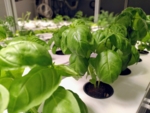
Thinking upwards: vertical farming to be further developed into continuous production
ROKO Farming’s novel technology is designed to produce fruit and vegetables worldwide all year round, while also freeing up areas for rewilding. This semi-automatic production method created by the Ulm-based business has huge future potential, as their success in innovation competitions demonstrates.
https://www.biooekonomie-bw.de/en/articles/news/thinking-upwards-vertical-farming-be-further-developed-continuous-production